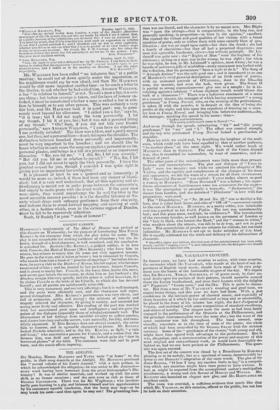THE ADELPHI.
ON Monday, Messrs. AIATHEWS and YATES were "at home" to the public, in their snug domicile at the Adelphi. Mr. MATHEWS produced the " second volume of his Comic Annual," with a neat preface, in which he acknowledged the obligations he was under to Dr. JOHNSON— every word having been borrowed from the great lexicographer's Dic- tionary ! It was of similar materials, and worked up with the same skill, as on former occasions ; and the cuts were as rich as those of GEORGE CRTJIKSHANK. There was fat Mr. Waglinton ; who involun- tarily goes hunting in a gig, and balances himself and his apprehensions by his customary equable conclusion, that the horse may stop—or he imay break his neck—and then again he may not 1 The grumbling foot. man was too literal, and the character is by no means new. Mrs. Blight was " upon the average—that is comparatively, in the long run, and generally speaking, in proportion—at least in our opinion," excellent. She ripened the virtues and good qualities of her victims with a broad sunshine of praise, only to wither them with some easterly blast of qua.. lineation : one was an angel upon earth—but then she drank ; she had a family of cberubims—but they all had a perpetual ringworm ; one man was agreeable, handsome, clever—but without principle. Mr. Lit- tlemiff was quite new : the " Rights of Man " were the bugbear of his existence; as long as a man was in the wrong, he was right ; but whoa he was right, he was, in Mr. Littlemiff 's opinion, most wrong ; lie was a bundle of nerves—a jelly of morbidity—every annoyance was barbed with the reflection, that his persecutors" have a right to do it." The Song of " Armagh Assizes" was the only good one ; and it introduced to us one of MATHEWS'S vivid pictorial descriptions of an Irish court of justice, with an animated portrait of O'CONNELL, done to the life—the tone, the manner, and even the look, were given. The Great 0 is partial to strong expressions—we give one as a sample : lie is in- veighing against a calumny " whose slightest breath would blister the back of a rhinoceros ! " There was a ludicrous enactment of a scene at a country theatre, the manager of which having announced " a young gentleman" as Young Norval, who, on the evening of the performance, is taken ill with the measles, is in despair at the idea of losing the profits of the night, and hits upon the expedient of dressing up a coun- try lout as Young Norval, and bringing him before the audience,—he,
the manager, speaking the speech in his name : thus- " Ladies and Gentlemen,
This young gentleman's name is Norval I "-
And so on through the speech, substituting " his " and " this young gentleman," for " my " and " I." The effect was comical enough, and the boy who personated Young Norval looked a petrifaction of stupidity. Here we wish we could end, by describing the laughter of the audi-
ence, which could only have been equalled by that of another audience, "in another place," on the same night. We would rather laugh at MATnEws than at SADLER. The only fault of the Comic Annual was, that it resembled its namesakes, in want of connexion, and de-
ficiency of point. The other parts of the entertainment were little more than personi-
fications and metamorphoses. The plot and dialogue of " Yates in Italy " were too meagre ; and while we admired the ubiquity of Mr. YATES, and the rapidity and completeness of the changes of his dress and appearance, we felt the want of a reason for all these clevernesses. His " Beautiful Bar-maid" was capital : YATES makes almost as good a woman as .111a...rnEws. "Beau Brummell " was a failure ; his super- fluous affectations of fastidiousness were too evanescent tbr the stage— it was like attempting to personify a butterfly. " Jacksonnini," the dancer from London, and the deformed "Dilettante" in love with fine proportions, were good.
The " Diapolologue," or "No. 26 and No. 27," was so decided a fai- lure, that it called forth hisses and cries of " Off, off "—unwonted sounds to the ears of MATHEWS. MATHEWS, as a merry cooler, was inimitable —it was a pendant to his Caleb Pipkin. The rest was unredeemably bad ; and this piece must, we think, be withdrawn.* The introduction of the two crazy females, so well known on the pavement of London as the "lady in black, who haunts the Bank," and the " woman in white," who wanders about the streets, was felt to lie de trop, and not in good taste. The eccentricities of people are subjects for ridicule, but not their infirmities. Mr. MATnEws is not apt to make mistakes of this kind. He is equally celebrated for the truth and delicacy of his delineations of character.
• Sinecothe above was written, this last part of the entertainment has been with- drawn ; and the "singing cooler " is now transplanted into the first part—we should have been sorry to have lost him.


























 Previous page
Previous page